The Hashemite Kingdom of Jordan sits at a strategic point in the Middle East. It is located on the left side of the Jordan River on Israel’s eastern border, northwest of Saudi Arabia, north of Syria, and east of Iraq, which places it at the crossroads of the Jewish, Muslim, and Christian Holy Lands. Covering nearly 90,000 square miles, the country has of 6.5 million of which almost 80% live in urban areas, and over a million people in the capital of Amman. The vast majority of the people in Jordan are Sunni Muslims, with a small minority of Christians.
Constitutional history
Jordan was ruled by several different powers throughout its history, though its modern history began with the Great Arab Revolt of 1916 that threw off the rule of the Ottoman Turks who had occupied the territory since the 16th century. Even though an Arab government in Damascus claimed sovereignty over the territory, the San Remo Conference of 1920 gave mandate powers over the territory. The British placed Amir Abdullah Ibn Al-Hussein, a descendent of the Prophet Mohammed, in charge of the newly coined Emirate of TransJordan. When the British mandate ended on 22 May 1946, Amir Abdullah was crowned king of the now independent state of Jordan. A parliamentary system headed by the King was established.
When the British mandate over Palestine ended two years later, Jordan took part in a pan-Arab military movement that invaded the area which the British had intended as the independent Jewish state of Israel. The war between Israel and the Arab states gave Jordan control over the Old City section of Israel and the West Bank. King Abdullah integrated this region into the government of Jordan by giving it equal representation in the Parliament. However, the King was assassinated in 1951, and after a brief rule of his eldest son Talal who was deposed due to illness, Abdullah’s eldest grandson became King Hussein Ibn Talal Al-Hashimi in 1953 at the age of eighteen. In 1952, a new constitution was created, but it gave the King significant power. However, after Jordan lost the West Bank to Israel in 1967, the King imposed martial law. During this time, many restrictions on the press and speech were imposed. In 1989, King Hussein finally began to initiate gradual political liberalization, first with the reinstitution of parliamentary elections, then the legalization of political parties in 1992.
1952 Constitution
The Constitution of 1952 created a constitutional monarchy with a monarch, prime minister, council of ministers, bicameral legislature, judiciary, and high tribunal. Under this constitution, Islam became the national religion, and Arabic the national language. However, it also recognizes religious and ethnic pluralism by banning discrimination based on race, language, or religion. While it recognized many personal freedoms such as the freedom of worship, expression, assembly, and the press, these freedoms were subject to possible limitation by law. Before martial law was lifted in 1992, the King did in fact limit these freedoms, and in 1992, the legislature again limited the freedom of the press.
Executive branch
While power is nominally divided among the three branches of government, the Monarch retains much of the actual power of government. The monarchy is hereditary, though the King has the power to appoint his own heir from among his male family members. He may only be removed for mental illness. This may be accomplished if the legislature votes to depose him by resolution. If the King finds himself to be unable to perform his duties, he may designate a Vice-regent or Council of Vice-regents to rule for him. These duties include ratifying laws, declaring war and peace, ratifying treaties, creating and conferring military ranks and honours, and granting pardons. He also maintains some very powerful checks on the other governing powers. He may call for elections, convene and close legislative sessions, and dissolve either of the two houses of the legislature. Additionally, the King has the power to appoint and dismiss the Prime Minister, the Ministers of the Council on the recommendation of the Prime Minster, and the members of the Senate. The King is meant to act on the advice of his cabinet, called the Council of Ministers, which is entrusted with administering the laws and affairs of state. Every decree of the King must be co-signed by the Prime Minister and other appropriate ministers. The Council is headed by the Prime Minister who is appointed by the King from the Parliament. If the King dismisses the Prime Minister, then all of the Ministers of the Council are thereby removed from office as well. Additionally, the legislature may remove any Minister or the Council by casting a majority vote of no confidence. The legislature may also impeach a Minister with a two-thirds majority vote and removal by the High Tribunal.
Legislative branch
The Parliament, or Majlis al-'Umma, shares legislative power with the King. The upper house is the Senate. Its members are appointed by the King to four year terms from among the notables of the nation, including former Prime Ministers and Ministers, retired military officers, judges, and ambassadors, as well as those who have been engaged in civil and public service. The number of Senators is limited, however, to half the number of the members of the lower house. The Senate meets in conjunction with the lower house, called the Chamber of Deputies. The members of the Chamber are elected by direct election also to four year terms, with a certain number of seats reserved for women. However, the King may extend or shorten the term by one or two years. Neither Senators nor Deputies may be closely related to the King. In order for a bill to become a law, it must begin in the Chamber of Deputies, be passed by both houses, and ratified by the monarch. Any bill not ratified by the monarch can be passed by a two-thirds vote in each house. In addition, the legislature has the right of interpellation and may pass votes of no confidence.
Judicial branch
The Constitution divides the judicial authority into three categories: civil, religious, and special courts. Civil courts have jurisdiction over civil and criminal cases. Religious courts are governed by religious law and may only hear cases concerning personal matters between two believers, or if one party is not a believer, by consent of all parties. Special courts comprise military and administrative courts as created by law. Civil and religious court judges are appointed by the king, while special court appointments are governed by law. This system is headed by the High Tribunal, comprised of the head of the Senate as President, 3 elected members, and 5 members selected from the most senior judges from the highest civil court. The High Tribunal has the power of constitutional review if requested by the Council of Ministers or an absolute majority of either house of Parliament. It may also try impeachments of Ministers as recommended by the legislature. There is also a Special Tribunal which may interpret any law that has not been interpreted by a court or the High Tribunal, if asked by the Prime Minister. The President of the highest civil court sits as the Chairman of this tribunal, accompanied by two other judges of the civil courts and one government official appointed by the Council of Ministers.
Political Challenges
In the wake of the 2011 unrest in Egypt and Tunisia, mass demonstrations broke out throughout the country as people called for political reforms that would address economic problems such as corruption, inflation, poverty, and high unemployment. This led King Abdullah to replace his Prime Minister and create a National Dialogue Commission with a mandate to address political, constitutional, and election reforms. The King also restated his commitment to promoting long term economic growth and stability through the promotion of information technology, democracy, economic reform, and global integration, a plan embodied in his 2004 National Agenda.
System of government under 1952 Constitution
Timeline
| 1916 | Great Arab Revolt leads to overthrow of Ottoman Turk empire in Jordan |
| 1920 | San Remo Conference divides the Middle East between Britain and France, putting Transjordan under British control |
| 22 May 1946 | Transjordan recognized by the United Nations as an independent country |
| 1948 | British mandate in Palestine ends in creation of Israel and invasion by Arab coalition force |
| 1950 | West Bank and Old City of Jerusalem annexed by Jordan |
| 20 July 1951 | King Abdullah I assassinated and son Talal named King |
| 1952 | King Talal removed due to mental illness and h replaced by eldest son Hussein, new, democratic constitution passed granting most power to the monarch |
| 1967 | Jordan loses the West Bank to Israel during Six Day War, martial law instituted which resulted in curtailment of personal freedoms and the freedom of the press |
| 1989 | King allows first general election since martial law began, despite ban on political parties |
| 1990 | National Charter reaffirming allegiance of political leaders to the King and commitment to democracy signed |
| 1992 | Ban on political parties lifted |
| 1994 | Israel and Jordan sign a peace treaty after 46 years of war |
| 7 February 1999 | King Hussein dies, his eldest son Abdullah II crowned king |
| 2000 | King Abdullah begins economic modernization program by signing onto the World Trade Organization |
| 2001 | Jordan seeks to build closer trade ties with Europe by signing onto the European Free Trade Association |
| 2003 | Parliamentary elections result in victory of pro-monarchy candidates, Jordan backs American-led coalition invasion of Iraq that results in deposition of Saddam Hussein |
| 2005 | King Abdullah replaces his cabinet due to unhappiness with the pace of reforms, terrorist attacks on three international hotels leads to deaths of 60 people |
| November 2007 | Pro-government candidates win parliamentary elections despite protests of Islamic Action Front of vote-rigging |
| November 2009 | Parliament dissolved due to continuing disappointment of King over slow pace of reform, new electoral laws criticized as not being more representational |
| November 2010 | Parliamentary elections lead to another victory for pro-government candidates, sparking nation-wide protests |
| 2011 | Popular protests inspired by similar protests in Tunisia and Egypt force King Abdullah to appoint a new Prime Minister charged with reforming the economy and politics |
Bibliography
- United States. CIA World Factbook: Jordan. , 2011. Web. 8 Jul 2011.
- "Jordan Country Profile." 09/06/2011. BBC News. Web. 8 Jul 2011.
- United States Department of State. Background Note: Jordan , 2011. Web. 8 Jul 2011.
- "The Constitution of the Hashemite Kingdom of Jordan." King Abdullah II Official Website. Web. 8 Jul 2011.
- Maddex, Robert L. Constitutions of the World. 3rd ed. Washington, D.C.: CQ Press, 2008. Print.
| Branch | Hierarchy | Appointment | Powers | Removal |
|---|
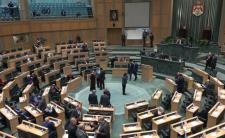
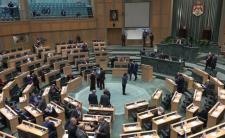
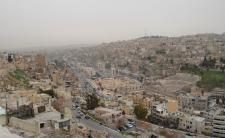
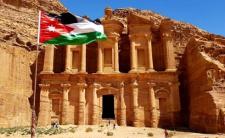
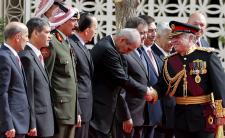
Share this article